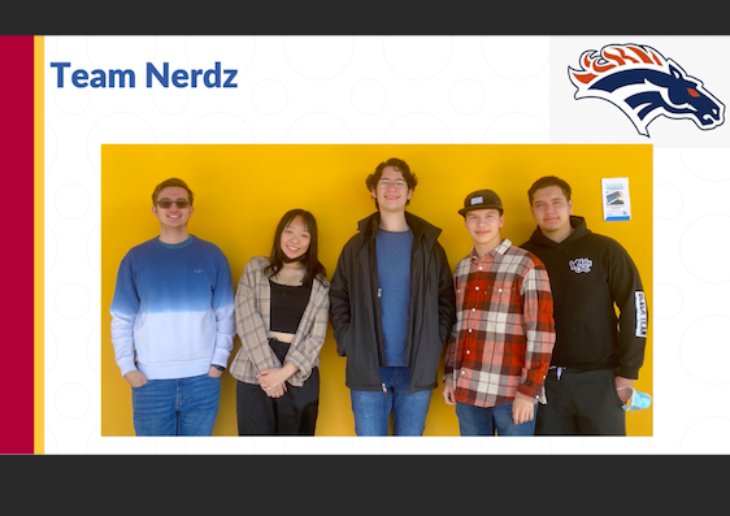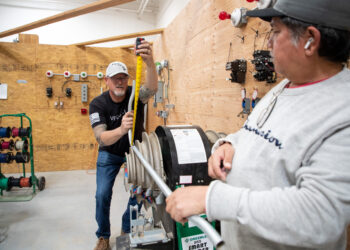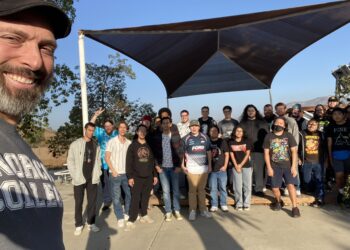IE’s Virtual Heroes: 4th Annual CA Mayor’s Cyber Cup Breaks Records & Boosts IT Careers

Careers fighting cybercrime aren’t just in demand — they’re also crucial. Most cyber criminals can hack an organization in as little as 12 hours, according to cybersecurity review site DataProt, with 70% of small businesses completely unprepared for an attack.
It takes virtual heroes to defend the world from cybercriminals. And in the Inland Empire, students put their high-tech superpowers to work in the Fourth Annual California Mayor’s Cyber Cup.
The rigorous three-hour competition brought record-breaking participation last March, with nearly 250 secondary and college students in 45 teams from across the region. Winners from each division included Landmark Middle School in Moreno Valley, Great Oak High School in Temecula, and Riverside City College. Yet every participant came away with real-world experience using in-demand cybersecurity skills — and an increased appreciation for where those talents might lead.
“There’s a tremendous skills gap in cybersecurity,” explains Susanne Mata, ICT & Digital Media Regional Director and Mayor’s Cup host. “It crosses every industry sector — everybody has a need to protect data confidentiality.”
With the demand for more than 700,000 cybersecurity professionals nationally, according to Cyberseek, it’s critical to get more students into the workforce pipeline.
Enter the California Mayor’s Cyber Cup, which began four years ago to respond to the overwhelming need to nurture cyber talent. The regional director says this year’s competition was 100% virtual, which “opened the event up and made it much more accessible to everybody.”
The competition was sponsored by Inland Empire/Desert Regional Consortium’s Strong Workforce funds and organized by the non-profit SynED, which supports workforce development between employers and education providers. Meanwhile, the platform was supplied by Cyber Skyline, famous for the National Cyber League and offering hands-on cybersecurity experiences to more than 100,000 students and professionals worldwide.
“Our big goal has been to build pathways to bridge the gap between curriculum and careers,” says Cyber Skyline CEO Franz Payer. “We provide challenges in the form of a puzzle, so students get to put themselves in the role of a CSI (Crime Scene Investigator) analyst.”
For example, competing students had to investigate data breach forensics and pinpoint how the hacker got into the system and what information they stole. As the CEO says, “Students get to experience that firsthand, and it goes a lot farther than just looking at slides or listening to lectures.”
The event had all the excitement of a sporting match, with each team accompanied by their theme songs, with separate divisions for middle school, high school, and college teams. Each student received a report of the skills they used during the event, showing where they could build various career pathways and where they could show off.
“For students who are close to graduation and ready to work in the industry, these skills reports are a great way to demonstrate to employers that they are ready for the job, even if they don’t have the years of experience,” says Payer.
As Mata adds, “It’s definitely a feather in their cap, and something students can share in their resumes and portfolios — and if they were on a winning team, even better.”
Entry-level cybersecurity jobs in the region have average salaries of $66,561 to upwards of $80,039, depending on education and experience. That’s why community colleges are launching grads into the industry with the competition — and beyond. With more internship and apprenticeship programs taking off, Mata says, “We’re trying to provide these opportunities so students can go directly from education right into the workforce, and we’re keeping our talent here.”
For example, take this year’s collegiate division winner, Riverside City College, which secured the Mayor’s Cup trophy for the second time in a row.
“We are so proud of our students and their success and the recognition they get,” says pleased RCC coach and CIS professor Skip Berry. “It is also a win to have the college administration see that our students are being successful.”
The instructor says his classes are “overflowing,” with 200 students this past year on the pathway for the Cyber Defense Associate of Science Degree or the Information Security Certificate and Cyber Defense Certificate that recently received validation by the National Security Agency and the Department of Homeland Security.
Last year, RCC also started a state-registered apprenticeship pathway. The College already boasts seven paid apprentices placed with employer partners, in addition to a robust for-credit unpaid internship program.
Mayor’s Cup participants discovered internship and apprenticeship opportunities and more in the week leading up to the competition. Every day featured an hour-long “Live@5” event, where students learned with industry partners and college faculty.
At Friday’s event, Berry teamed up with RCC business professor Dr. Ajené Wilcoxson to show how cybersecurity professionals can also become entrepreneurs. The instructors presented RCC’s new “Cyber-preneurship” program launching this fall, allowing grads to strike out as consultants, contractors, and business owners. The program culminates in a capstone where students present projects in a pitch competition.
“We’ll have industry leaders in the room hearing your pitches, and who knows what could happen from that!” said Wilcoxson at the Live@5 event.
The pregame events averaged about 100 students each night and showcased job developers offering interview and resume skills. Industry partners also participated, including the County of San Bernardino’s IT department, which provides cybersecurity internships to college students. Past event speakers have included the FBI agent who helped with one of the biggest cybercrime busts in the government’s history, inspiring the movie Breach.
“It’s a great career awareness event and a great chance to build partnerships with our employers,” says Mata.
The cup concluded with Moreno Valley Mayor Dr. Yxstian Gutierrez congratulating competitors, saying, “Make no mistake: The students that participated have what it takes to be a leader in the future of cybersecurity.”
Yet some students don’t need to wait for the future to demonstrate their leadership right now. Take RCC’s team captain Brandon Arias, who didn’t just usher the Tigers to victory. He also works full-time as a systems administrator for a public services agency, has already completed dual CIS certificates, and is just one class away from his cyber defense associate.
To hear Arias tell it, winning the coveted Mayor’s Cup isn’t the only thing the soon-to-be graduate is grateful for:
“Because of the awesome program at RCC, I have been accepted to the Dakota State University Cyber Operations program,” says the team captain. “I will be continuing my education there this spring.”
As for the competition, the student says winning was a rush. The close battle his team waged with second- and third-place winners Moreno Valley College and College of the Desert was down to the wire. For Arias, the fierce fight demonstrated the true takeaway:
“Winning any competition is a great feeling, especially among other colleges,” beams the team captain. “It shows that we are receiving a quality education.”
Sources:
https://dataprot.net/statistics/cybercrime-statistics/
https://www.cyberseek.org/heatmap.html



